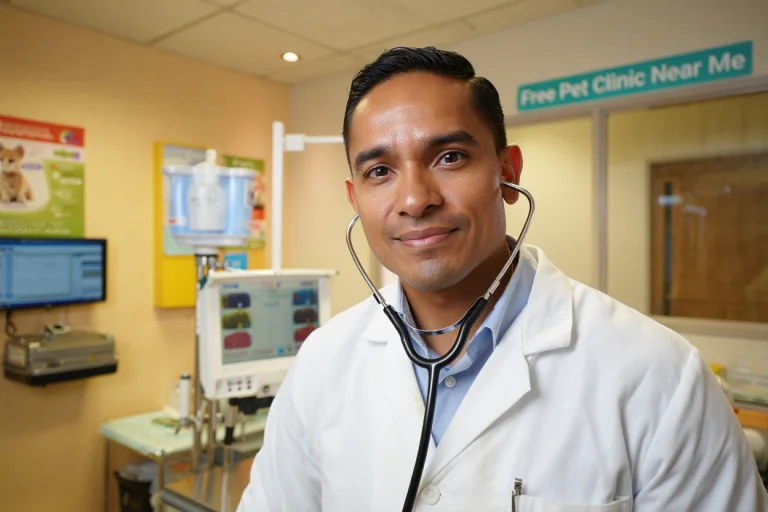Finding a Free Pet Clinics Near Me ? Discover 7 types of affordable veterinary care options in your area, qualification requirements .
Table of Contents

Every pet deserves quality healthcare, regardless of their owner’s financial situation. Finding a free pet clinic near me can be a lifesaver for pet parents facing economic challenges or unexpected veterinary expenses. These compassionate facilities bridge the gap between pet healthcare needs and financial constraints, ensuring our beloved companions receive necessary medical attention without breaking the bank.
In this comprehensive guide, we’ll explore seven types of free and low-cost pet clinics you might find in your area, how to locate them, what services they typically offer, and how to determine if you qualify for assistance. Whether you’ve recently adopted a new pet or are experiencing temporary financial hardship, this resource will help you navigate the world of affordable pet healthcare options in your community.
Understanding Free and Low-Cost Pet Clinics
What Are Free Pet Clinics?
Free pet clinics are veterinary facilities that provide basic healthcare services at no cost or significantly reduced prices to pet owners who meet certain eligibility requirements. These clinics operate through various funding models, including:
- Non-profit organizations
- Government grants
- Private donations
- Volunteer veterinary professionals
- Partnerships with animal welfare groups
While completely free services are available at some locations, many “free” pet clinics actually operate on a sliding scale fee structure based on income, offering reduced rates rather than entirely cost-free care. The primary goal remains the same: making essential pet healthcare accessible to all.
Types of Services Offered at Free Pet Clinics
Services vary widely between clinics, but most free or low-cost facilities focus on preventative care and basic treatments. Common services include:
- Vaccinations and preventative medications
- Wellness exams
- Spay/neuter surgeries
- Treatment for minor illnesses
- Basic dental care
- Microchipping
More specialized services like emergency care, complex surgeries, or treatment for chronic conditions may not be available at all free clinics, though some may offer referrals to affordable specialists or payment plans for more extensive care.

7 Types of Free Pet Clinics to Look For in Your Area
1. Non-Profit Veterinary Clinics
Non-profit veterinary clinics represent one of the most common types of free or low-cost pet healthcare facilities. These organizations operate with the primary mission of providing accessible veterinary care rather than generating profit.
Key Features:
- Often run by 501(c)(3) charitable organizations
- May require proof of income or financial need
- Typically staffed by licensed veterinarians and trained volunteers
- Services funded through grants, donations, and minimal service fees
Example Organization: The Humane Society Veterinary Medical Association operates and partners with numerous non-profit clinics across the country, offering preventative care and basic treatments at reduced costs.
How to Qualify: Most non-profit clinics require documentation proving financial need, such as proof of participation in government assistance programs (SNAP, Medicaid, WIC), unemployment benefits verification, or recent tax returns showing income below a certain threshold.
2. Mobile Vaccination and Wellness Clinics
Mobile clinics bring veterinary services directly to underserved communities, making pet healthcare more accessible for those with transportation limitations.
Key Features:
- Travel to different neighborhoods on scheduled dates
- Focus primarily on vaccinations and preventative care
- Often operate on weekends to accommodate working pet owners
- May set up in community centers, parking lots, or parks
Services Typically Offered:
- Core vaccinations (rabies, distemper, parvo)
- Microchipping
- Basic deworming
- Flea and tick preventatives
- Brief wellness exams
Cost Structure: Many mobile clinics offer services at significantly reduced rates compared to traditional veterinary practices, with some providing free vaccinations during special community events or through voucher programs.
3. Shelter-Affiliated Veterinary Services
Many animal shelters have expanded their missions to include affordable veterinary care for owned pets, not just animals awaiting adoption.
Key Features:
- Services may be limited to specific zip codes or communities
- Often prioritize preventative care to reduce pet surrender rates
- May offer special assistance programs for seniors or veterans
- Can provide affordable options for spay/neuter services
Notable Benefits:
- Supporting shelter-affiliated clinics often helps fund care for homeless animals
- Staff typically have extensive experience with common pet health issues
- May offer follow-up resources and pet care education
Finding Shelter Clinics: Contact your local animal shelter or humane society to inquire about low-cost veterinary services or community wellness events they may sponsor throughout the year.
4. Veterinary School Teaching Hospitals
Veterinary teaching hospitals affiliated with university veterinary programs often provide reduced-cost services while giving students valuable clinical experience under the supervision of experienced veterinarians.
Key Features:
- Comprehensive care options, including some specialized services
- State-of-the-art facilities and equipment
- Care provided by students supervised by board-certified veterinarians
- Potential for participation in clinical studies that include free treatment
Considerations:
- Appointments may take longer as students learn
- May require traveling to the university location
- Often have income qualification requirements for discounted services
- Typically require appointment scheduling well in advance
Major Veterinary Teaching Hospitals:
- University of California Davis Veterinary Medical Teaching Hospital
- Cornell University Hospital for Animals
- Tufts University Foster Hospital for Small Animals
- Ohio State University Veterinary Medical Center
- Colorado State University Veterinary Teaching Hospital
5. Community Outreach Programs by Private Practices
Some private veterinary practices dedicate specific days or services to community outreach, offering free or discounted care to those in need.
Key Features:
- May operate on designated “community service days”
- Often focus on specific services like vaccination clinics or dental days
- Typically require advance registration due to high demand
- May partner with local pet food banks or rescue organizations
Finding These Programs:
- Follow local veterinary practices on social media
- Join community pet owner groups online
- Check with local animal control for referrals
- Contact the state veterinary medical association for information about participants
6. Breed-Specific Rescue Organization Clinics
Many breed-specific rescue organizations offer veterinary assistance programs as part of their mission to support both rescued animals and pets in homes.
Key Features:
- Services may be limited to specific breeds or types of animals
- Often provide specialized knowledge about breed-specific health concerns
- May offer emergency assistance funds for urgent care
- Frequently operate through networks of volunteer veterinarians
Examples:
- Best Friends Animal Society operates full-service veterinary clinics in several cities
- National breed clubs often maintain veterinary assistance funds
- Regional rescue groups may host periodic wellness clinics
Eligibility Requirements: While some breed-specific programs focus only on animals of that breed, many have expanded to help all pets in need, particularly in underserved communities.
7. Grant-Funded Emergency Assistance Programs
For pet owners facing unexpected veterinary emergencies, various organizations provide financial assistance grants to help cover critical care costs.
Key Features:
- Focus on emergency or urgent care situations
- Often require application and approval before treatment
- May pay veterinary providers directly rather than reimbursing owners
- Typically one-time assistance rather than ongoing care
Notable Programs:
- RedRover Relief Urgent Care Grants
- The Pet Fund for non-emergency but essential treatments
- Brown Dog Foundation for pets with treatable conditions
- Shakespeare Animal Fund for seniors and disabled pet owners
Application Process: Most emergency grant programs require:
- Verification of financial need
- Cost estimate from a veterinarian
- Medical records documenting the condition
- Demonstration that the treatment will significantly improve quality of life

How to Find Free Pet Clinics near me in Your Area
Online Resources and Directories
Several comprehensive online directories can help you locate free or low-cost pet healthcare services in your community:
- PetSmart Charities Hospital Finder: Searchable database of reduced-cost clinics nationwide
- The Humane Society’s Financial Assistance Database: Resources organized by state and type of assistance needed
- ASPCA’s Low-Cost Spay/Neuter Programs: Directory focused specifically on affordable spay/neuter services
Community Resources for Locating Free Pet Clinics
Beyond online searches, valuable information about free pet clinics often comes through community connections:
- Local Animal Control Offices: Often maintain lists of affordable care options
- Public Libraries: Community resource specialists can direct you to local programs
- Social Service Agencies: Organizations helping low-income families frequently include pet resources
- Community Bulletin Boards: Check physical bulletin boards at pet stores, feed stores, and community centers
- 211 Helpline: In many areas, the 211 service includes information about pet assistance programs
Questions to Ask When Contacting Free Pet Clinics
When you identify potential clinics, gather the following information before scheduling a visit:
- What documentation is required to qualify for services?
- Which specific services are offered at reduced rates?
- Are appointments required, or do they accept walk-ins?
- What are the clinic’s hours of operation?
- Are there limits on the number of pets that can be treated?
- What forms of payment are accepted?
- Is there a waiting list for services, and if so, how long?
- Do they offer any emergency services outside regular hours?
Qualifying for Free Pet Clinic Services
Common Eligibility Requirements
Most free or low-cost pet clinics establish qualification criteria to ensure their services reach those most in need:
Financial Documentation Often Requested:
- Proof of participation in government assistance programs (Medicaid, SNAP, WIC)
- Tax returns showing income below specified thresholds
- Unemployment benefit verification
- Social Security award letters
- Veterans benefits documentation
- Student ID for income-challenged students
Geographic Restrictions: Many clinics serve specific zip codes or counties, particularly those designated as veterinary care deserts or low-income areas.
Special Populations: Some programs offer assistance specifically for:
- Senior citizens on fixed incomes
- Veterans and active military personnel
- Persons with disabilities
- Individuals experiencing homelessness
- Recently unemployed individuals
Preparing for Your Visit to a Free Pet Clinic
When visiting a free or low-cost clinic, preparation ensures you receive the most efficient service:
Bring the Following:
- All required eligibility documentation
- Pet’s previous medical records if available
- List of current medications
- Notes about any symptoms or concerns
- Current weight of your pet
- Appropriate carrier or leash for safe handling
Additional Considerations:
- Arrive early, as many clinics operate on a first-come, first-served basis
- Expect longer wait times than at private practices
- Bring water and comfort items for your pet during the wait
- Have realistic expectations about service limitations
Making the Most of Free Pet Clinic Services
Preventative Care Focus
Free and low-cost clinics typically emphasize preventative medicine to help pet owners avoid more costly issues down the road. Take advantage of these services:
Routine Preventative Care:
- Annual vaccinations prevent expensive and dangerous diseases
- Regular deworming prevents internal parasite infestations
- Flea and tick prevention avoids skin conditions and infestations
- Dental checks prevent painful and costly dental disease
- Early detection screenings identify problems before they become severe
Building a Healthcare Plan With Limited Resources
Working with free clinic veterinarians to develop a realistic healthcare plan can maximize your pet’s health within budget constraints:
Strategic Healthcare Planning:
- Prioritize core vaccinations and preventatives based on lifestyle risk factors
- Discuss lower-cost food options that still meet nutritional needs
- Learn basic at-home monitoring techniques to catch issues early
- Understand which symptoms require immediate attention versus those that can wait
- Create a small emergency fund specifically for pet healthcare needs
Beyond the Clinic: Additional Resources for Pet Owners
Pet Food Banks and Assistance Programs
Many communities offer supplemental resources to help pet owners keep their animals well-fed and healthy:
Food Assistance Programs:
- Meals on Wheels has pet food delivery programs in many areas
- Local pet food banks operate through shelters and community centers
- Some human food banks now include pet food sections
- Pet food manufacturers occasionally sponsor distribution events
Finding These Resources:
- Contact local animal shelters for referrals
- Ask at free pet clinics near me about affiliated support services
- Check social media for community pet support groups
Temporary Foster Programs During Crisis
For pet owners facing housing insecurity, hospitalization, or domestic violence situations, temporary fostering programs can provide safe housing for pets:
Crisis Foster Resources:
- RedRover’s Safe Escape program for domestic violence situations
- Safe Haven programs at local shelters
- Military deployment foster networks
- Hospital crisis fostering for medical emergencies
These programs aim to keep pets with their families long-term by providing temporary care during difficult transitions.
Recommended Pet Products on Amazon
Preventative Care Essentials
Maintaining your pet’s health between clinic visits is crucial. These affordable products can help:
- Pet Basics Flea and Tick Prevention Collar – Long-lasting protection at a fraction of prescription costs
- VetWell Dog & Cat Ear Cleaner – Prevents common ear infections before they require veterinary intervention
- HomeoPet Digestive Upsets Natural Homeopathic Remedy – Natural support for minor digestive issues
- Vetoquinol Enzadent Enzymatic Toothpaste Kit – Budget-friendly dental care to prevent costly dental procedures
Frequently Asked Questions About Free Pet Clinics
Q: Can I get emergency care at a free pet clinic?
A: Most free pet clinics focus on preventative care and scheduled services rather than emergency treatment. For true emergencies, you may need to visit a traditional emergency veterinary hospital. However, some clinics offer urgent care services during regular hours, and organizations like RedRover provide emergency financial grants for qualifying situations.
Q: Will the quality of care be lower at a free clinic?
A: Free and low-cost clinics are staffed by licensed veterinary professionals committed to providing quality care. While they may have fewer diagnostic tools or specialists on staff compared to full-service hospitals, the essential preventative and basic treatment services are delivered according to professional standards. Many free clinic veterinarians choose this work specifically because they’re passionate about helping all animals receive care.
Q: How often can I use free pet clinic services?
A: Usage policies vary by clinic. Some allow unlimited visits for qualifying individuals, while others may limit the number of visits per year or restrict certain services to one-time use. Many clinics aim to provide ongoing preventative care relationships rather than just one-time assistance, but resource limitations may require certain restrictions.
Q: What if my pet needs a treatment not offered by the free clinic?
A: Free clinics often maintain referral relationships with full-service veterinary practices that offer discounted rates for patients referred from free clinics. Additionally, clinic staff can typically provide information about financial assistance programs for specific treatments, payment plans, or credit options like Care Credit for veterinary expenses.
Q: Do free pet clinics near me treat all types of pets?
A: Most free or low-cost clinics focus primarily on dogs and cats, as these represent the majority of pets needing assistance. However, some clinics may offer limited services for small mammals like rabbits, guinea pigs, or hamsters. Exotic pets, reptiles, and birds often require specialists and may not be treated at general free clinics.
Supporting Free Pet Clinics near me in Your Community
Free pet clinics rely on community support to continue their vital work. Consider these ways to give back:
- Volunteer your time: Many clinics need administrative help, cleaning assistance, or pet handlers
- Donate supplies: From office materials to pet food and towels, in-kind donations help reduce operational costs
- Spread awareness: Share information about clinic services with those who might benefit
- Professional skills: Veterinary professionals can volunteer services, while marketers, fundraisers, and grant writers can help with operational support
Conclusion: Accessing Quality Pet Care for Every Budget
Finding a free pet clinic near me can be the difference between a pet receiving necessary care or going without. By utilizing the resources outlined in this guide, pet owners facing financial challenges can access preventative care, basic treatments, and sometimes even specialized services at little to no cost.
Remember that early intervention through preventative care often prevents more serious and expensive health issues down the road. Regular visits to free pet clinics for vaccinations, wellness exams, and minor concerns can significantly improve your pet’s long-term health outcomes while managing costs effectively.
Have you used a free or low-cost pet clinic in your community? We’d love to hear about your experience! For more pet care tips and guides tailored to budget-conscious pet parents, visit BlithePet for expert recommendations on keeping your furry family members healthy and happy without breaking the bank.




